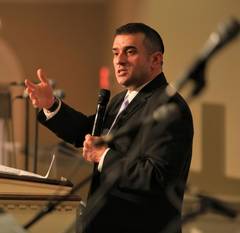- About Us
- Learning
- Resources
- Get Involved
- Membership
- Jobs
The way things are is not the way that things must be
07/07/2015 03:39:00 AM
| Author | |
| Date Added | |
| Automatically create summary | |
| Summary |
At a certain level, we know that the rules we live by aren't entirely fair.
As Leonard Cohen put it, "Everybody knows that the dice are loaded," and in some ways, we just have to deal with it. "Everybody knows the deal is rotten," and there's not much we can do about it.
Occasionally, though, somebody does do something about it.
Way back when our Israelite ancestors were trudging through the desert, a man named Zelophehad died. He had five children, all girls. Everybody knew what the rule was: sons could inherit their father's land; daughters could not.
Everybody knew the game was fixed except these five women, Mahlah, Hoglah, Milcah, Tirzah and Noa, who knew something else.
They knew the rule wasn't fair. They knew the rule would leave them landless, penniless and helpless. So they told Moses that his rule was unfair and needed to be changed.
Of course, this rule was the law of Moses the lawgiver, who was leading the people on the authority of the Holy One. What that really meant was that the women were telling Moses that God's rule was unfair and needed to be changed. "Give to us a possession among our father's brothers," they told Moses.
Note well the polite, but firm, lack of a question mark in that sentence.
The women had a sense of justice, they were organized and they were bold, and so we read this week (Num 27:5) "Moses brought their case before the Lord. And the Lord spoke to Moses, saying: The daughters of Zelophehad are right in what they are saying; you shall indeed let them possess an inheritance among their father's brothers and pass the inheritance of their father on to them. You shall also say to the Israelites, 'If a man dies, and has no son, then you shall pass his inheritance on to his daughter. … It shall be for the Israelites a statute and ordinance.'"
The way things are is not the way that things must be. Fundamental, transformational change is possible, and indeed, you might need to be the agent of change. There are few more important lessons that the Torah has to teach us.
In our country, at this moment, things are changing. Much of that change is happening because there are people who have a sense of justice, who are organized and who are bold.
Here in Beacon, a number of people have been working for months to change relations between police and the communities they serve. There have been conversations and public forums throughout the city, and what has emerged are some broad ambitions for policing in Beacon. You can see them here. These ambitions will be presented to the City Council on Monday, July 13 at 7:00 PM and everyone is welcome to attend. Following that presentation, a team led in part by BHA member Mark Ungar will work with citizens and public officials to turn those ambitions into specific, actionable steps we will ask the city to take.
The effort to improve police community relations has been a long and complicated process. You can read more about it here. It is not a process with a villain, and it is not a process that assumes that there is one specific that can be changed.
It is a process, however, that does not assume that the way things are is the way they have to be. It is a process that assumes that not only can things be better, but that we - the descendants of Mahlah, Hoglah, Milcah, Tirzah and Noa - can be the ones who can make it better. May we ever be guided by their example.
If you'd like to be updated on the effort to improve police/community relations in Beacon, please sign up for updates here.
Thu, November 6 2025
15 Cheshvan 5786
RABBI BRENT SPODEK

Join Our Mailing List
Privacy Settings | Privacy Policy | Member Terms
©2025 All rights reserved. Find out more about ShulCloud


